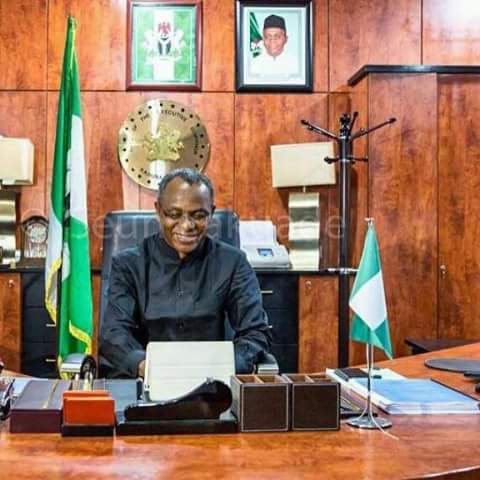
Once again, Barrister James Kanyip addresses a thorny issue with keen insight…
RE: KDSG TELLS KASU-ASUU ITS STRIKE ACTION IS UNLAWFUL
On Friday, 15/09/2017, my Brother, Samaila Aruwan, the Senior Special Assistant to the Governor of Kaduna State on Media and Publicity, wrote on his Facebook Timeline that, as a sub-national entity, the Kaduna State Government (KDSG) was a separate entity from the Federal Government of Nigeria (FGN); and since there was no dispute between KDSG and the Academic Staff Union of Universities of Kaduna State University (KASU-ASSU), KDSG had therefore declared the strike action embarked by KASU-ASUU as unlawful.
Consequently, KDSG declared that it would not be liable to pay the salaries and allowances for the period of the unlawful strike; and that it shall proceed to initiate the necessary disciplinary steps in accordance with Kaduna State Public Service Rules to deal with individual that chose to join or persist in the unlawful strike.
I think the position of KDSG as stated by Aruwan above is grossly misconceived and therefore rashly misplaced.
FIRST, the Academic Staff Union of Universities (ASSU) is a trade union in Nigeria governed by the Trade Unions Act, a Federal Legislation. Its membership comprises of academic staff from both the Federal and State Universities.
SECOND, by virtue of its status as a trade union, the national body of ASSU can, under the Labour Act which is also a Federal Legislation, collectively bargain and enter into a National Collective Agreement pact with the FGN on behalf of its members which, by extension and necessary implications, includes and covers the State Governments that own Universities.
Here, the status of KASU-ASUU is akin to that of the Nigeria Labour Congress (NLC) and Trade Union Congress (TUC) in two instances.
In the first instance, whenever there is the need to collectively bargain or negotiate for an increase in national minimum wage, NLC and TUC do so with the FGN only. However, the State Governments are bound by the Collective Agreement reached in respect thereof eventhough they were not parties to it.
In the second instance, when the national body of NLC and TUC call for a nation-wide industrial action, it is expected that all other State branches should follow suit. It is unheard of for State Governments to declare the decisions of the branches in their respective States to join the industrial action as unlawful
THIRD, is KDSG bound by the National Collective Agreement of ASUU and the FGN?
I think the answer is in the affirmative.
Labour is a federal matter. Therefore, it is outside the purview of KDSG and other State Governments.
Item 34 of the Exclusive Legislative List contained in Part 1 of the 2nd Schedule to the 1999 Nigerian Constitution specifically states so thus:
“Labour, including trade unions, industrial relations; conditions, safety and welfare of labour; industrial disputes; prescribing a national minimum wage for the Federation or any part thereof; and industrial arbitrations.”
Based on the above constitutional provision, the FGN can bargain with ASUU and enter into a Collective Agreement that has national applicability and enforceability against both the FGN and the State Governments.
FOURTH, the KDSG is not the appropriate authority or body to declare the industrial action of KASU-ASUU as unlawful the way it did. It is only the National Industrial Court of Nigeria that has the jurisdiction and competence to do so.
FIFTH, the Kaduna State Public Service Rules are not applicable to members of KASU-ASUU because the University has its own rules and regulations governing the terms and conditions of service of its academic staff which are sui generis to it. Therefore, to apply the Public Service Rules to the University to “discipline” the members of KASU-ASUU the way KDSG threatened to do is ultra vires its powers and therefore unlawful.
SIXTH, KDSG is completely oblivious of the fact that in labour-related matters, especially issues bordering on Collective Bargaining and Collective Agreement pacts, the solidarity bond is: “one for all; and all for one”. This means that what affects a Federal University also affects a State University and vice versa because they all under the single umbrella of ASSU.
The implication of the above is that if the demands of ASSU are met by the FGN consequent upon the industrial action they have now embarked on, KASU-ASUU will also be a beneficiary. So, why would it not join the industrial action in solidarity?
SEVENTH, let us even look at the issue outside the legal environment. If the KDSG had been and is still enjoying educational largesse from the FGN through TETFUND and other funds and aids as a result of the positive impact of the collective struggle of ASUU, what standing does it have to now declare the decision of KASU-ASUU to join the national body of ASSU in the industrial action as unlawful?
The bond, comradeship and solidarity of unionism are so strong that a Governor or Government cannot break them that easily.
The position taken by KDSG against KASU-ASUU is unnecessary. It is contrary to best national and international standard labour practice.
James KANYIP
16/09/2017.









